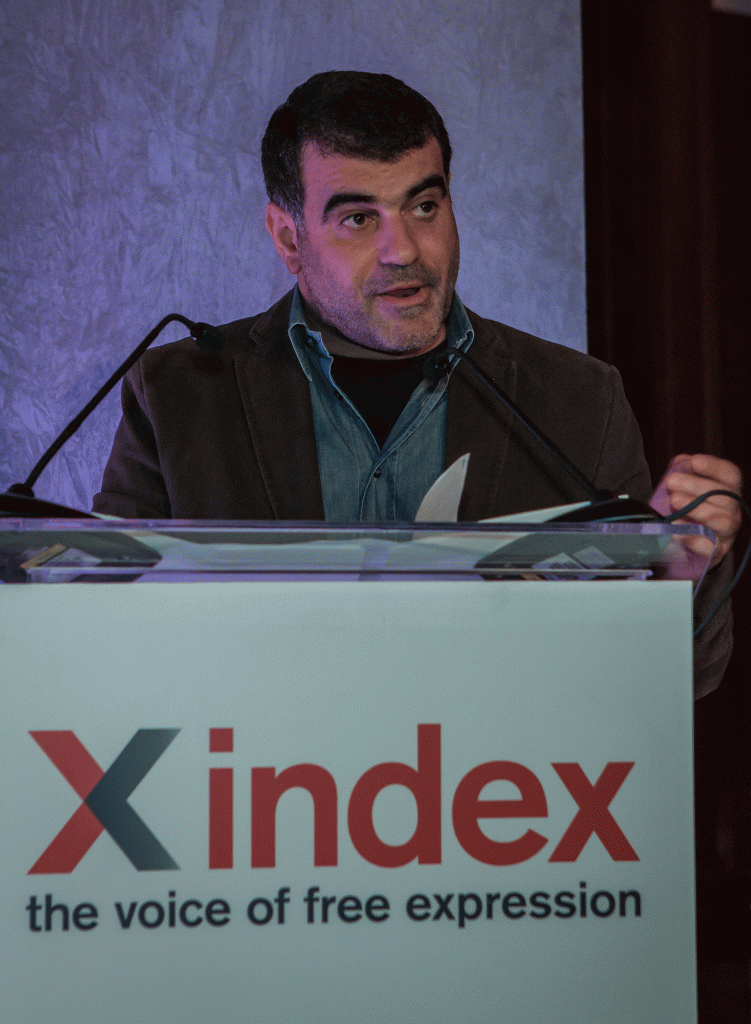9 Jun 2013 | Europe and Central Asia, Greece
The Greek journalist who published the infamous “Lagarde list” of Swiss bank accounts could face two years in jail for breaching privacy. In the latest development, his trial was postponed to October. Padraig Reidy reports
 Index on Censorship award winner Kostas Vaxevanis returned to an Athens court on Monday for a fresh hearing in his prosecution for the publication of details of secret bank accounts. The case was postponed to October 2013, according to tweets by @asteris and @ibiris.
Index on Censorship award winner Kostas Vaxevanis returned to an Athens court on Monday for a fresh hearing in his prosecution for the publication of details of secret bank accounts. The case was postponed to October 2013, according to tweets by @asteris and @ibiris.
(more…)
5 Jun 2013 | Egypt
A campaign called ‘Tamarod’ has already gathered millions of signatures calling for the ousting of Egyptian president Mohamed Morsi. Shahira Amin reports on the growing discontent with the country’s first post-revolution president
A campaign titled ‘Tamarod’ (the Arabic word for rebellion), calling for the fall of President Mohamed Morsi, is quickly gaining momentum in Egypt. The brainchild of the country’s ‘Kefaya’ (which means enough in Arabic) movement — the petition calling for Morsi’s ouster has had more than 7.5 million signatures to date. The campaign’s organisers say they hope to gather 15 million signatures by 30 June, the first anniversary of Morsi’s inauguration. They have also called for a mass protest in front of the Ittihadeya Presidential Palace the same day, in efforts to pressure Morsi into stepping down from the presidency and call for early presidential elections.
Scores of youth volunteers have been standing on busy street corners in Cairo’s affluent Zamalek and Mohandesseen neighbourhoods, urging commuters to sign the petition highlighting Morsi’s failure to deliver on his campaign promises of improving the economy, narrowing the country’s economic divide, and restoring security on the streets. Curious drivers and pedestrians stop to read the leaflets, bringing traffic to a standstill as supporters of the campaign chant anti-government slogans, and flash victory signs.
“The response to the campaign has been overwhelming . Egyptians are growing increasingly frustrated with the faltering economy , soaring prices of basic commodities, the fragile security situation and persistent power cuts, ” said Naglaa Bakr, a Mohandesseen resident and housewife, who had just signed the petition. “Morsi has to go”, she added.
The popular movement has now begun to draw support different factions in Egypt’s fractured opposition. As the campaign picks up steam, members of the Egyptian Federation of Trade Unions, the Dostour (Arabic for constitution) Party, the Social Democratic Party, the Free Egyptians, the 6 April youth movement, and the Journalists’ Syndicate have lent their support.
Morsi, meanwhile, appears to be unthreatened by the initiative, saying that he “welcomes free expression as long as it is within a legal framework.” Prominent Muslim Brotherhood member Mohamed Al Betaguy dismissed the campaign as an “opinion poll”, and cast doubt on whether or not the organisers could turn the petition into mobilisation. The Salafi Al Nour party has also slammed the initiative, calling it “illegal and unconstitutional.”
TODAY ON INDEX
Violence against Muslims on the rise in Burma |
Free expression in the news | Turkey losing its way on free speech
INDEX EVENTS
Caught in the web: how free are we online?
The internet: free open space, wild wild west, or totalitarian state? However you view the web, in today’s world it is bringing both opportunities and threats for free expression. 10 June. More information
In response to Tamarod, Morsi’s Islamist supporters have launched their own campaign called ‘Tagarod’ — the Arabic word for impartiality. Tagarod’s leaders say that theirs is “an initiative to support legitimacy”, accusing Tamarod of aiming to destabilise the country and spread chaos. Tagarod’s founder, Assem Abdel Maged, is confident that his campaign would garner more signatures than those of Tamarod. Abdel Maged, who is also a member of the Jama’a Islamiya group, aims to use his own petition to prove that there are more Egyptians rallying behind the Islamist President than his opponents. The Tagarod campaign has also vowed to organise a million-man march to show solidarity with Morsi.
“The campaigns accentuate the secular-Islamist divide in the deeply polarised country. Tensions are building up ahead of protests planned for 30 June”, said Hadia Abdul Fattah, a Tamarod campaign member, who has been gathering signatures in the northeastern city of Damietta.
In recent weeks, several members of the Tamarod campaign have faced detention for distributing the petition on or near university campuses in Cairo, Sohag, and Zagazig. The targeted campaigners were forced to sign documents stating that they would no longer distribute Tamarod petitions, or take part in political activities on campus. In March, the Supreme Council of Universities banned political activities on campuses, under the pretence of ending violence between different political groups.
Some have warned that a crackdown on the movement could spark the kind of civil unrest that Morsi has been trying to avoid. Opposition activists say they will no longer tolerate any kind of repression, and vow to continue to protest until their demands are met.
Even if the campaign fails to reach its 15 million signature goal, activist and human rights lawyer Tarek Moawad told Index that the initiative highlights the crisis of legitimacy facing Morsi, and sends a clear message that Egyptians will not be silent about injustice. Morsi’s usage of Mubarak-era tactics to silence critics — whether it’s targeting journalists or the green light given to Islamist supporters attacking opposition activists — is a sign of the government’s weakness and vulnerability, he added.
Some analysts have also suggested that Egypt’s liberal opposition could use Tamarod to their advantage, by galvanising support for the liberal opposition in the upcoming parliamentary elections in October.
“If the political opposition can close ranks and adopt a unified stance, Tamarod may have the potential to boost gains for the secularist opposition which has so far failed to organise,” said Dr. Mostafa Kamel El Sayed, Professor of Political Science at Cairo University.
24 May 2013 | News, United Kingdom
Some UK politicians have said the murder of a soldier in Woolwich, London this week demonstrates the need for greater surveillance of communications data. But would a “snooper’s charter” really have made a difference? Index asked Emma Carr of Big Brother Watch and Jamie Bartlett of Demos for their views
Emma Carr, Deputy Director of Big Brother Watch

Emma Carr, Big Brother Watch
John Reid’s and others’ attempt to make a political argument about “essential” legislation just hours after the brutal murder in Woolwich this week was remarkable, given how little was known at the time and the fact the victim’s family had not even been informed of his death.
Yes, it is right to examine how our security services could have been aided to prevent the horrific scenes we saw in Woolwich this week, but to jump to conclusions and use the politics of fear to promote an agenda before the any detail is available is simply wrong.
Indeed, as the facts have begun to emerge, it seems the answer may look very different to the draft Communications Data bill.
If, as is reported to be the case, these two individuals were known to the security services — as was also the case for several of those involved in the 7/7 attack — then plainly it seems strange to suggest a policy that would collect data on every member of the public, massively increasing the volume of data the security services have to sift through. We should be asking what resources the security services need to expand their knowledge of people ‘on the radar’.
The choice isn’t between a communications data bill or nothing. Far from it. Indeed, as details of this horrific attack become clear, it is looking more likely that the “Snooper’s Charter” would not have prevented. If it is a case of two individuals, working together but not as part of a wider organisation, then internet records may not be a critical factor. Of course, their personal devices — laptops, mobiles and other technology — will have a huge amount of information on them, far more than the bill would have created.
Equally, it’s worth noting the draft Communications Data Bill prohibited the storing or viewing of the content of communications. When someone is considered a significant enough threat for security services to prohibit them leaving the country, frankly I would hope the content of their messages is being read. The powers currently exist to order the retention of data on an individual, but that has a 30 day time limit. This seems unduly restrictive on the police, and should be extended.
Even if other powers were used to intercept messages, British courts still block the use of intercept evidence in court, an handicap not seen in the US or countless other countries.
The nature of terrorism has changed significantly over the past decade. Low-tech equipment and so-called “lone wolf” attackers are clearly now a real threat. The Communications Data Bill was a concept formed in the middle of the last decade, and is rapidly looking both disproportionate and out of date.
As announced in the Queen’s speech, the Government is already working on ensuring that the police can identify who is using a certain internet IP address to enable them to trace threats. It should be possible to do this in a way that supports the police, as well as protecting privacy, and it is right the Government is focusing on this important step.
But to use this tragedy as a springboard for recording the details of every British citizen’s emails, web browsing and social media messages is both a failure to learn the lessons of recent incidents and a continuing failure to recognise that surveillance of an entire population is both an unacceptable intrusion on our freedoms and a chilling effect on free expression for anyone communicating in, or with, the UK. It also risks diverting resources away from the security services at a time when they are more in need of targeted surveillance than ever before.
@EmmaFrancesCarr
Jamie Bartlett, Head, Violence and Extremism programme, Demos

Jamie Bartlett, Demos
I wrote back in April, after Nick Clegg announced on LBC he would be sinking the Communications Data Bill, that it would be back soon. This was because both Committees (there were two, one in secret) that reviewed the Draft Bill last year accepted that changes in the way we communicate makes it harder for the security services, HMRC and the police to get hold of the information they need to do their work effectively. Both agreed that new powers were needed soon. They just didn’t think much of the Home Office’s proposals.
I didn’t expect it to be quite so soon. Even though I’ve been mildly in favour of the Bill, I was disappointed to see Lords Carlile and Reid, eight short hours after someone had been brutally murdered, suggest that this might mean reviving the Bill. To give the Home Office some credit, I’m not sure they’ve been quite so bullish, and neither has the Prime Minister.
Distasteful it may be, but there is one point I agree with: whenever we make legislation relating to security or counter-terrorism, we need to remember that threat from Al-Qaeda inspired — and other — violent groups, is significant. Proportionality is a vital consideration any time we give legal powers of surveillance, and that means knowing what the threat is. At times, the debates on the “Snooper’s Charter” — and I took part in quite a lot of them — felt like it was taking place in a vacuum. So few people from the security side (where were all the terrorism experts that are now omnipresent, for example?) were willing to debate the issue that the argument was lop-sided. It was being widely derided as nothing more than a measure to give more powers of surveillance, rather than an attempt to improve public safety and security in a way that was necessary and proportionate.
I’m sceptical that the Communications Data Bill could have prevented this attack. It required very little coordination, technical know how or planning: almost impossible to spot and stop. But it may have been useful in the aftermath. The first thing on the minds of the police and security services would have been whether this was part of a coordinated series of attacks, and they would have wanted to know, very quickly, who these two had been communicating with and when. Imagining the types of forums they likely visited, it might very well have been the sorts of communications service providers wouldn’t have been able or willing to share rapidly. Communications data may also be important in the week ahead for longer-term investigations and in securing convictions of any collaborators, if there were any. But — and it is a big but — I am speculating. I simply do not know.
Either way, this one attack should not dictate our counter-terrorism laws. A new settlement is needed, not because of this incident, but because of changes in communication, attitudes to privacy, the new possibilities of mass surveillance, and the growing complexity of terrorist and criminal activity. As I’ve argued elsewhere, social media intelligence is of increasing value to the police in particular, but its regulation and use under the Regulation of Investigatory Powers Act remains unclear. This Act as a whole needs a re-refresh, and communications data is an important part of that. But this week is not the time to do that.
@JamieJBartlett
21 May 2013 | Europe and Central Asia
A novel published by current Irish Justice Minister Alan Shatter in 1989, has been referred to the country’s Censorship of Publications Board, according to reports.
Laura: A Novel You Will Never Forget which features a politician pressures his lover to have an abortion, is currently available on Amazon, coming with the lone user review:
this book by alan is his only novel. its about the traumas of adoption in ireland with a bit of fact based on fiction..parts of this book could be true as i was involved with a real life case similar to this book…it,s a must read and should be republished..have plenty tissues at the ready as many a tear will appear in the eye.
Shatter is currently at the heart of a political storm after he used information learned from a Garda briefing to him in his role as Justice Minister to attack a political opponent, flamboyant independent TD (member of parliament) Mick Wallace.
Speaking on a live TV debate, Shatter revealed that Wallace had escaped censure from traffic police after he was seen using his mobile phone while driving. Wallace has been campaigning against the overturning of motoring infringement penalty points for high profile and well-connected figures.
Meanwhile, Shatter’s Fine Gael party has come under attack from anti-abortion activists who believe the centre-right party is set to liberalise Ireland’s strict abortion law. Taoiseach and Fine Gael leader Enda Kenny faced protests from anti-abortion protesters during a visit to Boston yesterday.
Over 200 publications are banned in Ireland, including books on abortion and several sex manuals.
The majority of the rest of the banned titles are soft and hardcore porn magazines, including Playgirl and Scamp magazine.
Read the full list below
Register of Prohibited Publications in Republic of Ireland 2010
 Index on Censorship award winner Kostas Vaxevanis returned to an Athens court on Monday for a fresh hearing in his prosecution for the publication of details of secret bank accounts. The case was postponed to October 2013, according to tweets by @asteris and @ibiris.
Index on Censorship award winner Kostas Vaxevanis returned to an Athens court on Monday for a fresh hearing in his prosecution for the publication of details of secret bank accounts. The case was postponed to October 2013, according to tweets by @asteris and @ibiris.

